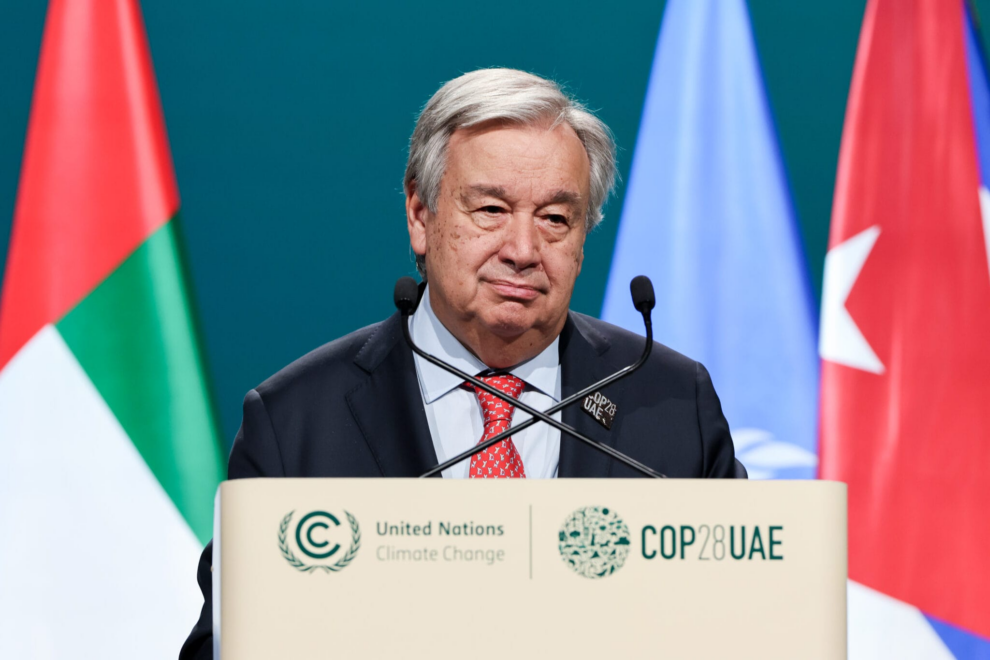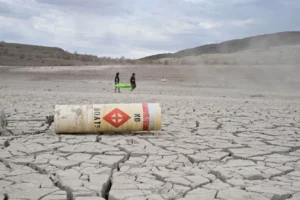“The 1.5-degree limit is only possible if we ultimately stop burning all fossil fuels,” UN Secretary-General António Guterres said last Friday in Dubai. “Not reduce. Not abate. Phaseout — with a clear timeframe aligned with 1.5 degrees C.”
Guterres made those remarks two days before news broke that Sultan Al Jaber, the president of COP28 and CEO of the United Arab Emirates’ state-owned oil company, had mansplained the science of fossil fuel phaseout to former Irish president Mary Robinson last month, preposterously claiming there was no science behind the need to phase out fossil fuels. As COP28 wraps its first week, it’s important for journalists to understand crucial distinctions in the language Guterres and Al Jaber are using — between “phasing out” fossil fuels and “phasing down” their use, and between “abated” and “unabated” use of dirty energy.
To start with, Guterres is correct. The IPCC has previously made clear that humanity needs to cut roughly 50% of greenhouse gas emissions by 2030 and totally phase out fossil fuels by 2050 to avoid the worst climate impacts. As the final clause of Guterres’s remarks stressed, the timing of such a phaseout is crucial. Phasing down fossil fuel use over the next five years can align with science if the result is to cut emissions in half by 2030. But ultimately, such a phasedown has to be a step towards an all-but-total phaseout of fossil fuels by 2050.
Which brings us to the role of “abating” fossil fuels. Al Jaber and other fossil fuel interests are fond of claiming that they are committed to phasing out “unabated” fossil fuels. This often amounts to rhetorical trickery, however. To be clear: “Unabated” refers to fossil energy sources whose emissions are not prevented from reaching and thus overheating the atmosphere — for example, through the use of carbon capture and storage technologies. But the idea that the world could ramp up carbon capture technology sufficiently to allow the continuation, even expansion, of fossil fuel use envisioned by oil and gas interests is “absurd,” Sir David King, a former chief science adviser to the UK government, said during a recent Covering Climate Now press briefing.
Saudi Arabia’s minister has already said his country will not agree to any language in the final text committing to even a phasedown of fossil fuels, much less a phase out. Because the final text of a COP requires a consensus vote, time and again petrostates have been able to stymie real progress. It’s here that civil society — and journalism — can shine: By exposing the deception and sheer obstinacy of big polluters blocking climate action.
In response, former US vice president Al Gore wants to strip the de facto veto power of fossil fuel states at future COPs. Gore told Bloomberg this week that he wants to change COP rules so that a final text can be approved by a 75% supermajority of countries, rather than the current requirement of unanimous consent. Given that more than 100 countries are already on record favoring a fossil fuel phaseout at this COP, this rule change could profoundly alter the balance of power at international climate negotiations — and their eventual outcomes. It would be “extremely difficult” to get such a rule change approved, Gore said, but “the stakes are so high that we have to try every strategy.”
Source : Covering Climate Now











Add Comment